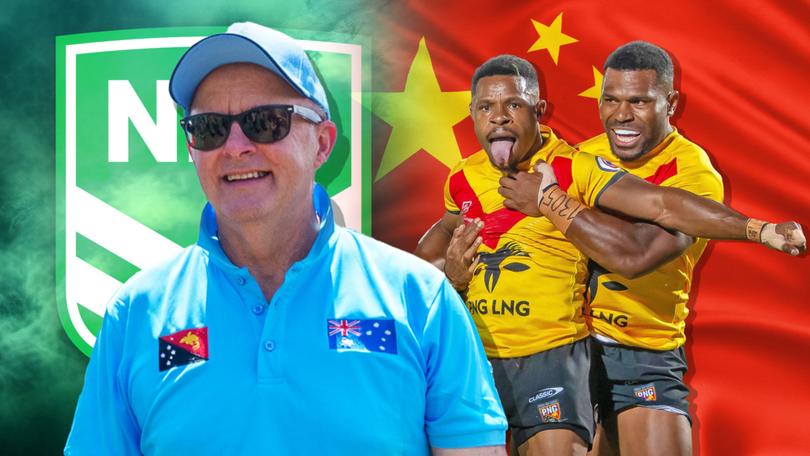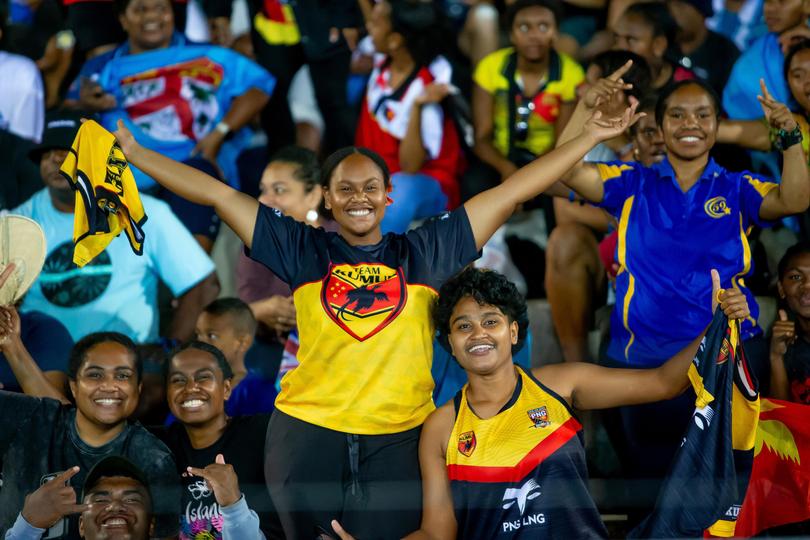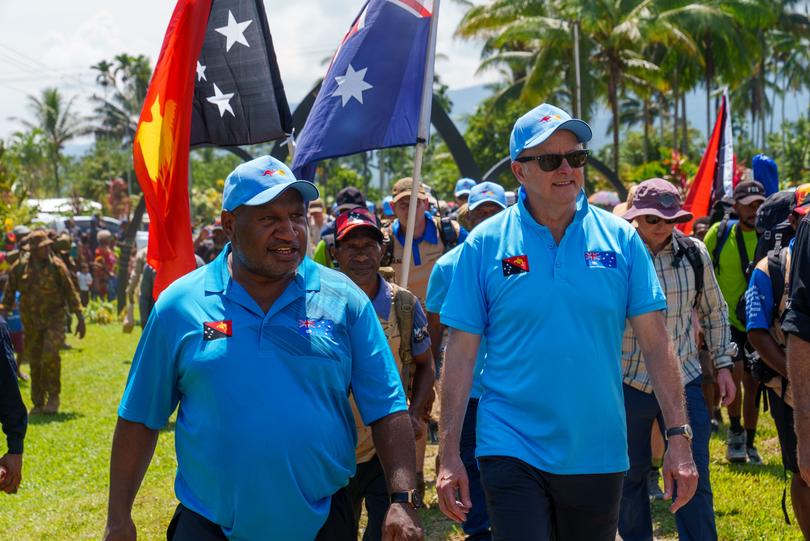Papua New Guinea NRL team aimed at curbing China’s influence as much as it is expanding the sport
Expanding the code into the Pacific is not just about spreading the good word of rugby league. It’s also about keeping Beijing at bay.

It’s the worst kept secret in rugby league, Papua New Guinea will be announced as the next NRL team next week as the code expands the competition into a third country.
Australian taxpayers will foot the bill for the new franchise to the tune of $600 million over the next decade and, while it is clear PNG is mad about its rugby league, the enormous Federal Government support for this bid over several others suggests more is at play than growing the sport in the Pacific.
Prime Minister Anthony Albanese, a South Sydney tragic, has been vocal in his support of the bid and will be on hand to make the announcement next week.
Sign up to The Nightly's newsletters.
Get the first look at the digital newspaper, curated daily stories and breaking headlines delivered to your inbox.
By continuing you agree to our Terms and Privacy Policy.But it’s not all about league and countering Chinese influence appears an obvious reason to strengthen our ties with our nearest neighbour, particularly with an uncertain four years ahead under what is expected to be a tumultuous Trump presidency.
While not an implicit part of the deal — in terms of stopping PNG signing further security or economic deals with Beijing — the NRL team will help offset the influence of China’s Belt and Road and Global Development Initiatives which has funded the redevelopment of major infrastructure like ports and airports.
PNG is considered of great strategic importance to Beijing to strengthen its interest in the Pacific at the cost of Australia’s.
Australia has invested in health, education and infrastructure in PNG and has ongoing defence and cyber security agreements in place. It is also closely aligned with PNG through trade, namely in mining and agriculture.
The PNG team’s entry had initially been slated for 2028, but the timing is likely to rely on the NRL’s ongoing plans to expand into Western Australia.
The Western Bears had been on track to beat PNG to enter the NRL and join as the 18th team in 2027, until a consortium comprising local investors and the North Sydney Bears had its bid rejected in October.
The NRL has since engaged the WA Government in talks over funding, with the Bears bid also keen to revise their pitch.
Other bids for a fifth team Queensland based in Ipswich and a second New Zealand team are also in the works — but PNG has been at the front of the queue despite concerns over security.
PNG Foreign Minister Justin Tkatchenko said a special compound would be built to protect the team’s players and families so it will be interesting to see which players decide to venture to the largely lawless country to extend or further their careers. One carrot for prospective players is they will earn tax-free income.
Finding the right coach for what will be a diplomatic role as much as sporting one will also be vital.
Ousted South Sydney coach Jason Demetriou leads the PNG national team but said he had no designs on taking on the NRL job.
“I’m already involved in terms of coaching the Kumuls,” he said.
“For me, it’s about what I can do now to support the game’s growth to rise the Kumuls.”
He said the new team would increase the game’s growth footprint in PNG.
“It’s going to open the door for PNG rugby league to continue its growth,” Demetriou said.
“They’ll sell out that stadium. They’ll probably have to increase the capacity because they’ll sell that out every week.”

The team will also be doing a lot of travel with a trip to play the Melbourne Storm taking six hours, while a game against the New Zealand Warriors will take eight.
The NRL will have to be creative in its scheduling to keep the 17 current teams on side with the long travel times the PNG team will bring to the competition.
Both PNG and Australia have been coy on the spectre of China in the NRL deal but Minister for International Development and the Pacific Pat Conroy did touch on the “national interest” benefit of having a team in PNG.
“Australia and PNG share a unique historical bond and a love of rugby league. A PNG NRL team will tie us closer together. It will advance Australia’s national interest in contributing to a safe, stable and prosperous Pacific region,” he said.
PNG Prime Minister James Marape said in October the deal was about more than geopolitics.
“For PNG and Australia, we have deeper sentimental values. Both nations love rugby league, both nations have a strong affinity. And all in all, we’re working towards far bigger issues than just the security aspect to it,” he told the ABC
But Federal Government sources told The Australian security in the region was definitely a key driver of the deal.
Mr Tkatchenko said on Wednesday his country had not been asked to agree to any security arrangements as part of the agreement with Australia.
“We don’t need to commit ourselves in that regard. You know, the game has nothing to do with China at all,” he told The Australian.
“This is to get us into the NRL. This is to build up our relationship between Australia and Papua New Guinea through sport. And we don’t want to get disrupted with geopolitics on this one.”

Rugby league has a long history in PNG after being introduced in the 1930s by Australian miners.
By the 1960s it had become the national sport and in 1975 the national team, the Kumuls, played their first Test match against Great Britian.
PNG is already part of the NRL framework with the Hunters playing in Queensland’s Intrust Super League, which they won in 2017 after joining in 2014.
Security is an ongoing issue. In February Queensland rugby league suspended home games for the PNG Hunters when unrest in the highlands resulted in nearly 50 deaths.
During NRL Magic Round in May, Security minister Peter Tsiamalili said having a team would actually improve the security situation in PNG.
“That will have a correlation to law and order, in my view. As the minister responsible for policing, it will really help us. Young men and women in PNG get inspired by the code. It will bring a different dynamic in the way we perceive ourselves,” he told Nine Newspapers.
The Albanese Government believes it can score big in the region, aided by the NRL, with a new team, but a lot will be at stake for the code and Australia when the opening whistle is blown in Port Morseby — hopefully in 2028.
